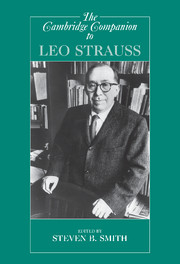Book contents
- Frontmatter
- 1 Introduction: Leo Strauss Today
- 2 Leo Strauss: The Outlines of a Life
- 3 Leo Strauss and the “Theologico-Political Predicament”
- 4 Strauss’s Recovery of Esotericism
- 5 Strauss’s Return to Premodern Thought
- 6 Leo Strauss and the Problem of the Modern
- 7 The Medieval Arabic Enlightenment
- 8 “To Spare the Vanquished and Crush the Arrogant”: Leo Strauss’s Lecture on “German Nihilism”
- 9 Leo Strauss’s Qualified Embrace of Liberal Democracy
- 10 Strauss and Social Science
- 11 The Complementarity of Political Philosophy and Liberal Education in the Thought of Leo Strauss
- 12 Straussians
- Bibliography
- Index
- Series List
6 - Leo Strauss and the Problem of the Modern
Published online by Cambridge University Press: 28 November 2009
- Frontmatter
- 1 Introduction: Leo Strauss Today
- 2 Leo Strauss: The Outlines of a Life
- 3 Leo Strauss and the “Theologico-Political Predicament”
- 4 Strauss’s Recovery of Esotericism
- 5 Strauss’s Return to Premodern Thought
- 6 Leo Strauss and the Problem of the Modern
- 7 The Medieval Arabic Enlightenment
- 8 “To Spare the Vanquished and Crush the Arrogant”: Leo Strauss’s Lecture on “German Nihilism”
- 9 Leo Strauss’s Qualified Embrace of Liberal Democracy
- 10 Strauss and Social Science
- 11 The Complementarity of Political Philosophy and Liberal Education in the Thought of Leo Strauss
- 12 Straussians
- Bibliography
- Index
- Series List
Summary
Because I am going to argue that Leo Strauss's understanding of the problem of the modern has numerous affiliations with the thought of Martin Heidegger, it would be remiss of me not to begin with an etymology, a procedure often followed by Heidegger in his ontological (and postontological) musings. The etymology I have in mind also prepares us to appreciate the links between Hegel and Strauss, despite the relative silence of the latter concerning the former. According to the unabridged Oxford English dictionary, the word “modern” goes back to sixth-century CE Latin, and means “made just now,” by analogy with hodiernus, “made” today (i.e., “just recently” but not just now). Etymologies are not philosophical arguments but they help us understand what we are arguing about. If only for introductory purposes, it is helpful to hear the resonances of modus - order, measure, moderation, and modo - “just now, lately” and its opposite, “some time ago.” We may take one more speculative step, in keeping with both the etymologizing of the ancients and the dialectics of the moderns, to identify “modern” as a self-contradictory term. Its linguistic ancestry is both constitutive and dissolute, and it is thus a simulacrum of time. The term ”modern” thus qualifies as an example of what Hegel means when he speaks of philosophical or speculative words, and it also expresses the restlessness of the modern spirit, as Hegel refers to it. This comes very close to the Straussian understanding of the fundamental defect of the modern spirit. The modern is what is happening in an indeterminate “now.” As such, it is dissolving before our very eyes.
- Type
- Chapter
- Information
- The Cambridge Companion to Leo Strauss , pp. 119 - 136Publisher: Cambridge University PressPrint publication year: 2009



